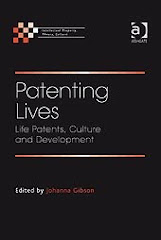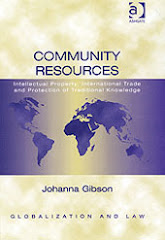Last night the Patenting Lives network hosted its first in a series of workshops on current issues in patent law, policy and development.

The first in the series was concerned with the proposed Directive of the European Parliament and of the Council on criminal measures aimed at ensuring the enforcement of intellectual property rights (Criminal Enforcement Directive also known as IPRED2 in view of its amendment this year). One participant described the Directive as the possible "Trojan Horse" that may be used to expand EU competence in the area of criminal justice, moving towards first pillar matters.
Background
The present proposal for IPRED2 is being considered by the European Parliament and the Council at present, as the Directive must be adopted following the co-decision procedure.
In the European Parliament it is presently before the Legal Affairs Committee. The rapporteur, Nicola Zingaretti (an Italian MEP), will present a draft report on the proposed Directive at the next meeting of the Legal Affairs Committee, 20 November 2006. If and when the Committee approves the report, there will be a vote at a plenary session of the European Parliament for its first reading.
Meanwhile, Member States are continuing to negotiate the text before the Council. The most recent Council text includes a number of amendments to the original Commission proposal. But until both the Council and the Parliament have finished the first reading the Directive cannot progress any further. At present, it looks like it might be held up before the Council, even if the Parliament is making progress.
The European Union is structured as "three pillars," - the European Communities, common foreign and security policy, and cooperation in justice and home affairs. Some Member States have indicated that they believe that the measure is not within Community competence as a first pillar instrument. Instead, they suggest that it should be a Framework Decision under the third pillar. It is anticipated that the Court of Justice's ruling in Case C-440/05 Commission v Council (ship source pollution) will give a good indication of whether or not IPRED2 can go forward as a first pillar Directive or will need to revert to being a Framework Decision.
Workshop
Around 35 participants took part in the seminar, which included presentations from Gwilym Roberts, partner at Kilburn & Strode Patent Attorneys; Phillip Johnson, DTI and legal adviser to the UK Patent Office, but speaking in his personal capacity; and Julian Heathcote Hobbins, senior legal counsel for the Federation Against Software Theft (FAST).
All speakers had reservations about the proposed Directive, some stronger than others, including predictions that it would be "completely disastrous."

Gwilym Roberts (pictured at left) very importantly identified not only the way in which it might impact upon patent practice, but also the significant commercial effect of criminalising patent infringement, "changing the game theory of decision-making at the commercial level." Rather than being able to negotiate normal commercial risk, commercial entities would now be constrained in their daily commercial decisions by the threat of criminal sanctions.
As Gwilym explained, copying a CD in large-scale copyright piracy is quite a different concern from the very complicated questions to be considered when trying to determine whether a patent has been "copied." The application of criminal sanctions to all areas of intellectual property simply cannot be justified by the same arguments. He said that the patent system is not designed to implement public health policy (such as the arguments concerned with health risks and counterfeit medicines) and should not be expected to deliver such regulation. Gwilym predicted that the Directive would effect a "significant stifling of innovation."

Julian Heathcote Hobbins (pictured at left) gave a detailed introduction to the activities of FAST and its position in the debate. Julian also identified the problem with trying to polarise the activities of users and proprietors as two mutually exclusive groups. Often in patentable technologies, proprietors are in effect potential infringers because of the very nature of innovation; therefore, as the workshop discussion largely considered, criminalising patents would interfere with the nature of innovation because it would elevate the risk of potential infringement to a level that noone would want to try to negotiate.

Phillip Johnson (pictured at right), who practised as a criminal barrister before moving into IP, gave a detailed background to the Directive. He noted the significance of applying criminal measures to all areas of intellectual property rights and outlined the potential public interest concerns with this kind of approach. In particular, the nature of criminal prosecution was discussed, including the consequences for the taxpayer. The impact of possible moves toward jury trials was also discussed, with the workshop discussion raising concerns over the possibly adverse impact on subsequent law, causing damage to the patent system in the long term.
In discussion, the impact on small and medium enterprises was considered as a potentially negative rather than positive consequence. The threat of criminal prosecution was debated as a way in which bigger interests could throw their weight around, effectively changing the landscape of the industry, with SMEs discouraged from entry into the market. Interestingly, Gwilym noted that the threat of criminal sanctions would be a public relations bonus to right-holders, giving a problematic moral high ground. He noted that, in contrast to the current bad press, a somewhat worrying outcome might be that prosecution of patent infringement is now re-presented as a "protection of the public" argument. Some participants suggested that big pharma was "playing the public health card."
Future Workshops
More workshops are planned, including discussions on the forthcoming report of the Gowers Review, a workshop on biopharmaceuticals and biosimilars, and more. If you'd like further details, email me, Johanna Gibson, to be on the mailing list, or check this blog and Patenting Lives for more.



2 comments:
Very interesting, I hope to see more articles on this topic!
Joeri Hamvas
Yes, it is.I am very interested in any ideas that you might have on the issue. Joeri and I will check this blog regularly, and don´t hesitate to contact us with any ideas or comments you think are appropriate.
Kind regards,
Edith Mastenbroek (MEP - PES)
Post a Comment